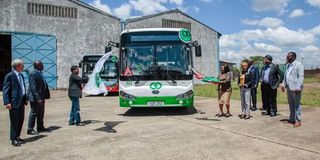Kenya's first electric vehicles assembly line unveiled

The Cabinet Secretary for Investments, Trade and Industry Rebecca Miano (right) flags off the first two E9 Kubwa buses at BasiGo’s Electric Bus production line in Thika town.
What you need to know:
- CS Miano said the assembly presents an opportunity to mitigate environmental degradation.
- The CS flagged off the first two E9 Kubwa buses that have been assembled at the plant.
Kenya has started assembling electric vehicles in the country.
This is after the Cabinet Secretary for Investments, Trade and Industry Rebecca Miano on Tuesday inaugurated BasiGo’s Electric Bus production line at the Kenya Vehicle Manufacturers plant in Thika.
This becomes Kenya’s first dedicated assembly line for modern electric buses.
The move comes two months after BasiGo completed the assembly of two E9 Kubwa buses, a 9-metre electric bus designed for the Kenyan PSV market.
Ms Miano said local assembly of electric vehicles presents an opportunity to mitigate environmental degradation as a result of greenhouse gas emissions, which will address effects of climate change.
“One of the key priorities of the government is addressing climate change and reducing greenhouse gas emissions. The transport sector is a significant contributor to carbon emissions and transitioning to electric vehicles presents a sustainable solution to mitigate environmental degradation and address the negative effects of climate change,” Ms Miano said.
During the event, the CS flagged off the first two E9 Kubwa buses that have been assembled at the plant, which will operate with Citi Hoppa and Super Metro Saccos.
Ms Miano said the government was prioritising creation of a conducive business and investment environment by setting up incentives to attract and retain investors in the sector.
BasiGo CEO, Jit Bhattacharya, noted that Kenya was positioning itself as the regional hub for the assembly of modern electrical vehicles, as the country’s public transports gets more sustainable.
“The transition to clean, electric buses represents more than just impact on the environment. It is an opportunity for Kenya to establish itself as a manufacturing hub for modern EV’s as well as the components that make up those vehicles," Bhattacharya said.
BasiGo plans to locally assemble 1,000 E-Buses for Kenyan bus operators over the next three years, an investment that will create 300 green manufacturing jobs in Kenya.
Already, BasiGo has more than 500 orders from bus operators in Nairobi and an additional 100 reservations from bus operators in Kigali, Rwanda.
“We have proven that local assembly is viable and impactful. Now, we urge policymakers to create an enabling environment that fosters innovation, job creation, and economic growth. Together, we can chart a brighter future for mobility in Kenya and Africa,” said Moses Nderitu, the BasiGo Kenya Managing Director.




